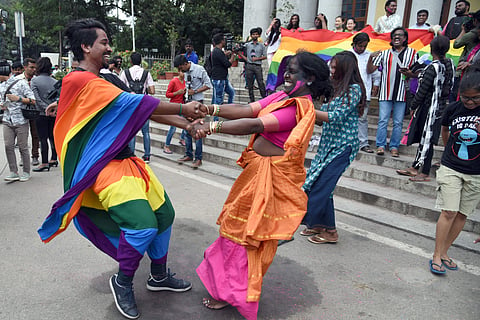

The Supreme Court of India on September 6 pronounced its historic verdict on Section 377 of the Indian Penal Code and legalised homosexuality, striking down the portions of the 157-year-old law that had forced homosexuals to live in fear and to avoid celebrating their love openly.
As soon as the verdict was pronounced, the LGBTQI community across the country burst into celebrations. Commercial brands were quick to join the bandwagon.
From makeup brands such as Lakme to food delivery services like Zomato and clothing brands like Jack and Jones, everyone within minutes had put out posters of their logos and products decked in rainbow colours. Cab service Uber painted the routes on the map with rainbow snakes and Ola's app reflected rainbow colours on the cars.
It may have all been echoing the spirit of celebration and solidarity, but in reality, have companies in India done anything for the people of LGBTQ community? No, is the common opinion.
“I’m glad that these companies are standing in solidarity but why suddenly now? A majority of the brands turned their logos into rainbows, it doesn't harm the community but if we look at the bigger picture, these communities have never stood up for the LGBTQ rights until today and majority of these companies do not hire transgender people, nor do they have a policy for it,” said professional drag queen and activist, Jabez Kelly.
Although the LGBTQI community doesn't hold a monopoly on "rainbow", the symbol to represent the community, rainbow or pink capitalism has become a new norm for commercial giants.
In the West, this is now reflected in the mainstream commercial market. Shoes, bags, clothes and accessories in the vibrant colours of the rainbow have flooded markets in Japan and China and these products are now slowly finding their way into India too.
Actual measures to help the community are few and far between. Transport giant Uber, which has an “Uberpride” community formed to promote LGBTQI inclusion and diversity, has hired a transgender Rani Kinnar as its cab driver. Their food delivery platform Uber Eats has employed another transgender Preethisha. Uber's immediate competitor Ola had provided employment to MBA graduate Meghna Sahoo as their first transgender cab driver partner earlier this year. These remain stray examples.
“It's sad to sit back and watch them flaunt their solidarity without giving anything back to the community. Brands are hijacking our identity and turning it into a gimmick,” feminist and queer activist Namithaa Jayasankar said.
However, not everybody thinks that brands running campaigns in the wake of the legalisation of homosexuality without ever having supported the cause is a bad thing.
LGBTQI activist Delfina, who works with Chennai based NGO Nirangal, claimed, “brands may use the 'pride' to market their products but then it opens a window for people unaware of the community to engage in the conversation. Although we get support from the heterosexual community, there are other ignorant people who might wake up to pride making its way to mainstream commodity market and acknowledge it. And instead of criticizing brands for capitalising on rainbow, we can ask them to translate this into reality and provide employment for the community".